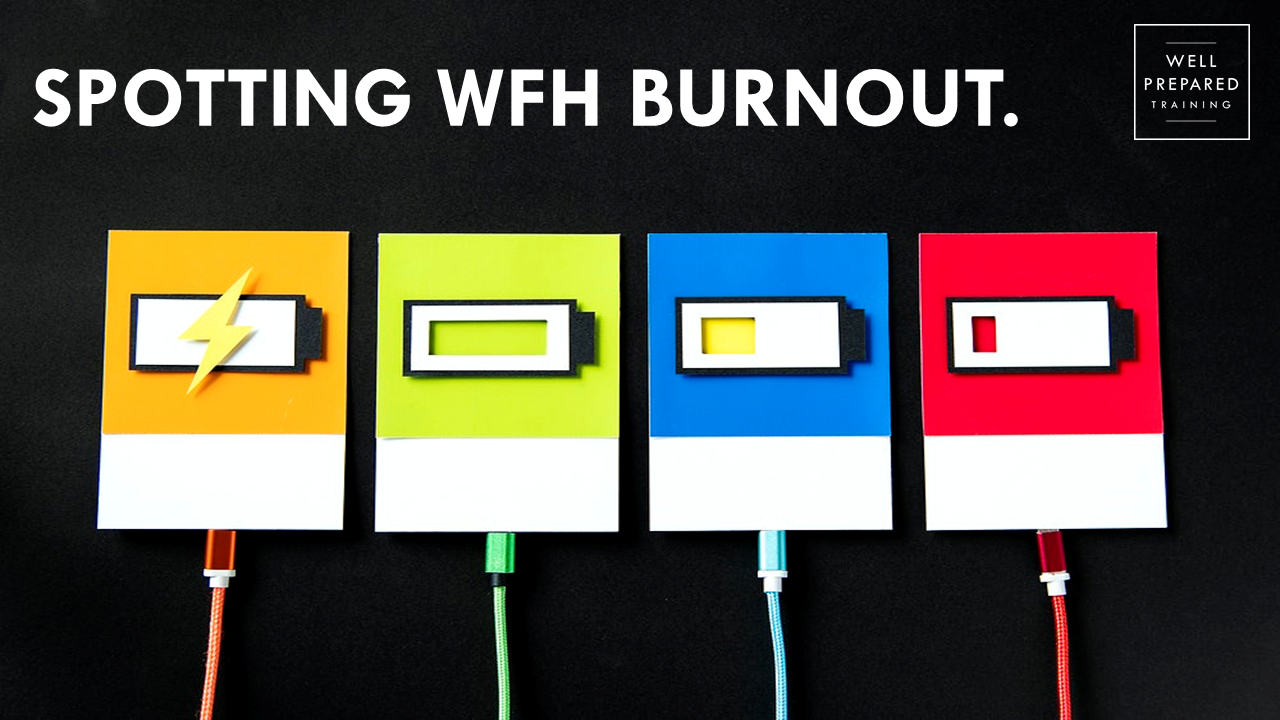ARE YOU SPOTTING THE SIGNS OF WORK FROM HOME BURN OUT?
Let’s face it. 2020 was a year to be remembered, or forgotten, depending on your experiences!
The amount of enforced change that we experienced was unheard of, and yet we’re still here, working hard and, more importantly, working remotely into 2021 and we are nearly at the half year point already!
Around the world millions of people made the very quick transition from an office to remote working and whilst some of us out there will have experienced this before, for many, it was something completely new, and in some cases, terrifying.
Dependant on the company you work for, their culture, their technology and their degree of future focus the experience of remote working has been vastly different for most people.
In a lot of cases employers started to panic about the simple fact – is the work going to still get done?
In reality, for the most part, it needn’t have been a concern. Productivity is linked to wellbeing and remote working for a lot of people has boosted the latter, therefore driving the former.
Obviously, this isn’t the picture for everyone, and we recognise that. Remote working doesn’t fit everyone’s lifestyles.
However, for those who are delivering the same, if not more, whilst working at home, there’s something else employers should be concerned about more than a drop in productivity.
THEY NEED TO BE LOOKING FOR WORKING FROM HOME BURNOUT.
This is not a drill. This is real. The risk that this will happen is high. Remember that oh so controversial song, Blurred Lines? That is what is happening now because the line between work time and home time is disappearing fast.
For some it’s the fact that they don’t have an office and seeing work equipment keeps their work brains always on.
For others they are feeling the fact their employers are focused on productivity and they don’t want people to think they’re not working. So, they work more.
Routines like breaks, lunch, meetings, chats by the coffee machine – they have all disappeared leaving only work in their place. Yes, we have Teams or Zoom, but it’s simply not the same. We don’t mean for a second that your working day should be all gossip, chit chat and eating, but it helps you strike a healthy balance, one that is being lost at home.
There is tons of research out there that repeatedly tells us that we must keep our work and personal lives separate. It is hard enough already to switch off after a particularly hard day, but when there is no escape it can have a profound effect on our mental health too.
In some cases, you as an employer. will start to spot burn out. You need to start looking for the signs.
Always on. Late night replies. Teams replies. Working through lunch. Frustration. Irritability. They might start making mistakes or taking longer to do work than before. It’s vital that you catch it early.
We’ve done the hard work for you and come up with 4 simple tips to help you stop working from home burn out affecting your team.
ONE. LEAD FROM THE FRONT
Your team are guided by you, they copy how you behave. You need to model the behaviour that you seek.
If you reply late at night, if you skip lunch, if you never say no then the chances are, you’re creating an army of followers that will do the same. If your team is particularly loyal, they may also see this as helping you and won’t want to let you down. Set some rules for the team and get buy in about what you think is fair and acceptable when remote working is in effect. Share them, review them, and most importantly stick to them.
For example, if you must send a late-night email, then change your signature to say that you choose to work at this time, but you don’t expect others to respond. A small message like that goes a long way to keep the culture on track.
Don’t do the very things you want them to avoid or it’s going to be a noticeably clear case of mixed messages!
TWO. LET THEM KNOW IT’S OK TO FLEX
Many people working from home are trying to replicate the work routine and structure, especially those with childcare to consider. Guess what? It doesn’t work. Think flexibility with the team and let them know its ok not to be sat at their computer at exactly 9am if they’re still getting a child into school or setting up children with activities. You must focus on the work that gets done, not the exact times it happens.
Make sure they know that they can take lunch, that its ok to grab 5 minutes, to walk the dog, to collect their food shopping, because if they cut all those things out for work, the remaining things bump over into personal life…and it won’t fit, and then stress becomes a factor, which takes us back to burn out.
THREE. FOCUS ON THE IMPORTANT STUFF
You do not want a team of busy fools. You need to help them prioritise if they cannot do it themselves. Help them see that its ok to not work on everything at once, that its most likely 3-4 hours will be one big chunk of work and the rest of the day will be smaller tasks, or multi-tasking and that there are times it’s ok to not be actually doing something. Thinking, reflecting, analysing, deciding…these things all take time too.
Working flat out, 9-5, day after day is not healthy and once again, will lead your team to burn out.
FOUR. BUILD GOOD HABITS
Set up a regular time that its ok to be social. Consider virtual coffee breaks, a virtual team lunch, a quiz, a birthday sign song. Factor these in and make them become healthy habits. It’s a clear sign from the leader that it’s time to stop, it’s time to let work go, and it’s time to relax a little.
Make sure you attend where appropriate, always ask people what they did in the evening or at lunch and continually build the belief that its ok not to be working all the time. We suggest you work with your team to encourage ownership of this, so that it’s their thing not yours.
IN SUMMARY
If you don’t want your team to suffer from working from home burn out then try to spend a few minutes now, thinking about what you just read, and see if you can spot the signs (in them, or even in yourself) and try to implement at least one of our 4 tips.
Remember – your team are looking to you to care for and nurture them, regardless whether you’re in the office or not.

